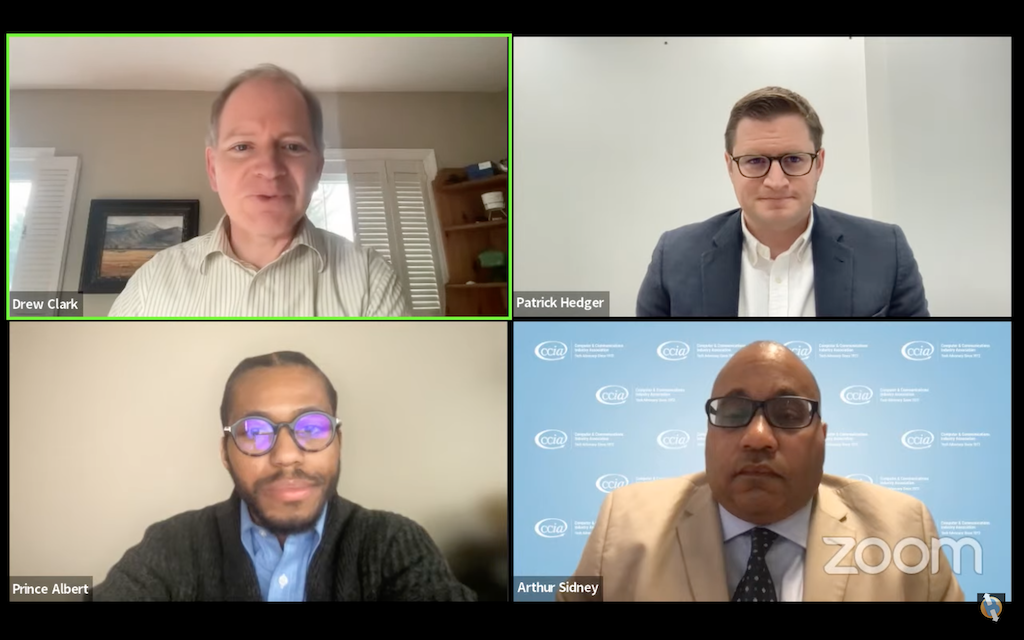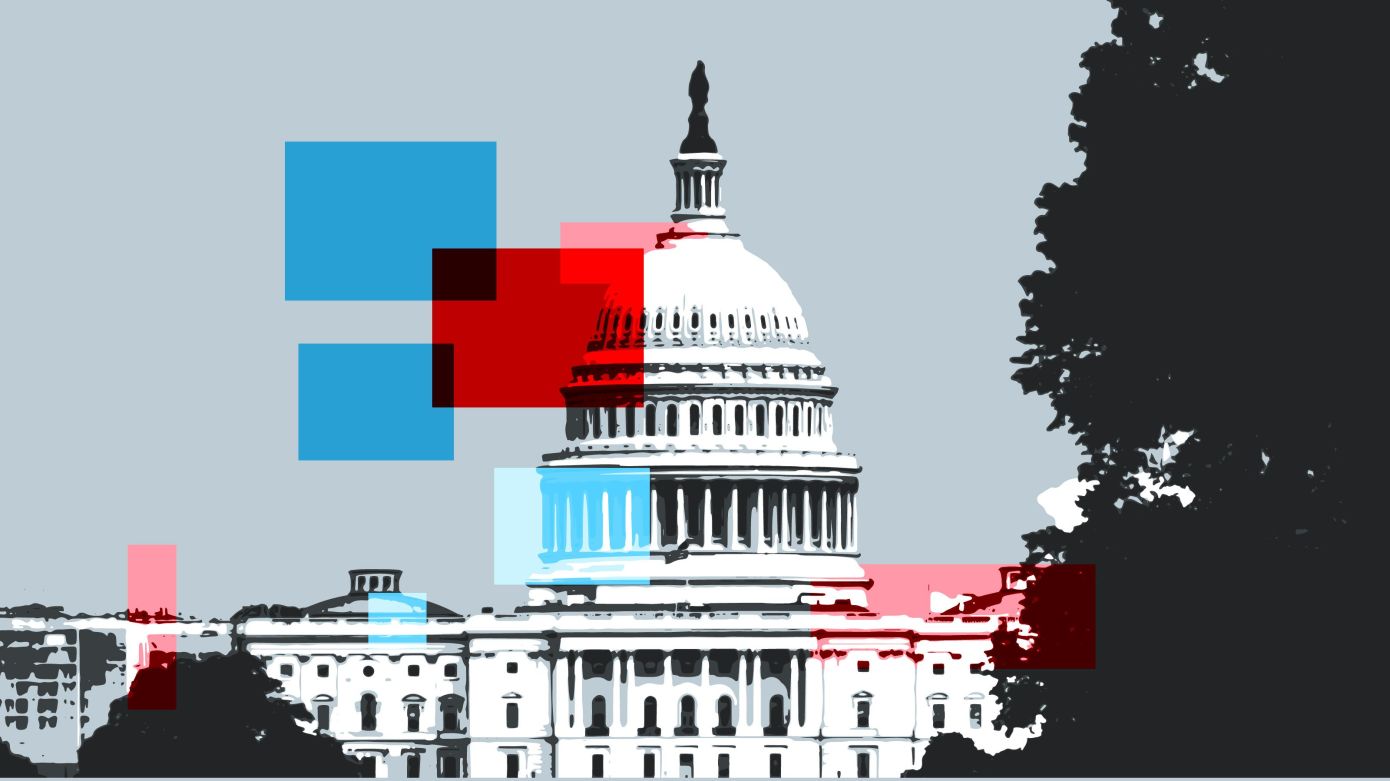Platform Product Preference Bill Unfairly Targets Large Online Platforms, CCIA Says
The Computer and Communications Industry Association counts as members Amazon, Google and Facebook.
Megan Boswell

WASHINGTON, March 24, 2022 – Proposed legislation that would prohibit large online platforms from engaging in practices like giving their own products preferential treatment over competitors is too narrowly defined to include a small group of big technology companies while excluding others, argued an association representing those large tech companies on Wednesday.
The American Innovation and Choice Online Act, which also aims to ban discrimination against third-party products on the host platform, defines covered companies under the legislation by their value – which some say will exclude other large retailers that may engage in the same practices the legislation hopes to abolish.
“The bill very carefully picks winners and losers,” Arthur Sidney, vice president of public policy at Computer and Communications Industry Association, said on a Broadband Breakfast panel Wednesday about the legislation that was passed by the Senate Judiciary Committee for Senate votes. The CCIA, which advocates for small and medium companies, also has among its members Amazon, Google and Facebook, three of the world’s largest companies.
“I do think that the bill penalizes big for being bad, but big…is not bad. It’s just a matter of success,” he said.
The legislation “prohibits certain large online platforms from engaging in specified acts, including giving preference to their own products on the platform, unfairly limiting the availability on the platform of competing products from another business, or discriminating in the application or enforcement of the platform’s terms of service among similarly situated users,” according to the bill.
CCIA’s President Matt Schruers said about the bill in January that targeting “leading businesses will skew competition and leave consumers worse off. By hamstringing successful U.S. tech companies without even imposing corresponding obligations on foreign rivals, this shortsighted legislation will put the data and security of U.S. users at risk.”
Amazon had been accused of violating antitrust laws when it allegedly used third-party sellers’ data to help increase the sales of its own products. On Friday, a Superior Court of D.C. judge dismissed the case against the company. Meanwhile, on this same matter, bipartisan House Judiciary members wrote to the Department of Justice this month alleging Amazon obstructed the committee’s “extensive investigation into competition in digital markets,” which took place last Congress.
Bill provides flexibility to capture other companies
But a government affairs policy counsel at advocacy group Public Knowledge, who sat opposite of Sidney at Wednesday’s event, said the legislation provides flexibility to capture other large companies that may engage in such practices.
“The [bill is] trying to encircle and analyze and scrutinize a market position” instead of targeting certain companies by name,” said Antoine Prince Albert III. “The [bill is] flexible with thresholds to show that a market position would be indicative by a market cap,” he said. Market capitalization is determined by multiplying the price of each share by how many shares it has outstanding.
It is “not targeting individual companies,” Albert said.
In the middle of these two viewpoints was Patrick Hedger, executive director of Taxpayers Protection Alliance. He said that “the market is a little more dynamic than the proponents of this legislation think,” evident by “Meta’s recent collapse in market cap,” whose stock price fell 25 percent after the company’s social media platform Facebook saw a decline in user growth.
If Meta “is at this market cap for the next two years, which is what some of the bill is prescribed for, they will no longer be a covered platform,” he said.

Photo of Drew Clark, Patrick Hedger, Antoine Prince Albert III, and Arthur Sidney at Wednesday’s event
Hedger also raised a bill proposed by Senator Amy Klobuchar, D-Minnesota, and Senator Tom Cotton, R-Arkansas, that contains a data enactment provision in this proposed legislation that means “only companies that are above the market cap at the date of enactment of the legislation will be covered in perpetuity, and not all the other ones that eventually grow to that level.”
This bill, titled the Platform Competition and Opportunity Act, aims to “prevent big tech from further suppressing competition through killer acquisitions” and establish “a presumption against mergers and acquisitions of potential competitors by the Big Tech companies,” according to a one-pager about the bill.
Our Broadband Breakfast Live Online events take place on Wednesday at 12 Noon ET. You can also PARTICIPATE in the current Broadband Breakfast Live Online event and REGISTER HERE.

Wednesday, March 23, 2022, 12 Noon ET — Big Tech and the American Innovation and Choice Online Act
Congress is ratcheting up its campaign against big tech. A specific focus of lawmakers is promoting competitiveness in markets a few big platforms dominate. The American Innovation and Choice Online Act prevents platforms giving preference to their own products and limiting the availability of competitors’ products. Will the bill accomplish its goals? What challenges does it face? Join us for the Broadband Breakfast Live Online event where panelists will hash out these and other issues.
Panelists for this Broadband Breakfast Live Online session:
- Antoine Prince Albert III, Government Affairs Policy Counsel, Public Knowledge
- Arthur Sidney, Vice President of Public Policy, Computer & Communications Industry Association (CCIA)
- Patrick Hedger, Executive Director, Taxpayers Protection Alliance
- Drew Clark (presenter and host), Editor and Publisher, Broadband Breakfast
Panelist resources:
- Big Tech, Big Problems, & Big Solutions, Public Knowledge
- Antoine Prince Albert III on the market structure of digital programs, Public Knowledge
- Manager’s Amendment Shows AICOA Not Ready for Prime Time, CCIA
- Senators Should Avoid Making the Digital Economy More European, CCIA
- How Proposed Legislation Would Break Digital Services, CCIA
- It’s Deja Vu for Yet Another Misguided Tech Regulation Proposal, CCIA
- National Security Issues Posed by House Antitrust Bills, CCIA
- National Security Letter on Antitrust, September 15, 2021
- Don’t Break What Works, CCIA
- Ukraine Invasion Brings Hypothetical Security Issues With Tech Bills Close to Reality, Taxpayers Protection Alliance
- App Security Project
- Klobuchar-Grassley Bill Obnoxiously Disdains Consumer Preference, RealClearMarkets
- American Choice & Innovation Online Act is a Net Negative for Competition, Taxpayers Protection Alliance
- Op-Ed: Federal antitrust bill would grant ‘sweeping new powers’ to federal bureaucrats, The Center Square

Antoine Prince Albert III is a Government Affairs Policy Counsel at Public Knowledge, Inc., a DC-based public interest group working to defend consumer rights in the emerging digital culture. At PK, Prince delivers high-impact advocacy strategies on issues like online platform governance and competition, Section 230, artificial intelligence and algorithms, music licensing, and privacy. He is routinely consulted for critical insights on how media and technology function within Black, Latino, Indigenous, and LGBTQIA2S+ communities of the United States, the Caribbean, and Africa.
Arthur D. Sidney, LLM is the VP of Public Policy at CCIA, where he started in June 2020. Formerly, he was chief of staff and chief counsel to Rep. Henry C. “Hank” Johnson, Jr., Chairman of the Subcommittee on Courts, Intellectual Property and the Internet, and served as an international trade attorney with the U.S. Department of Commerce where he focused upon trade remedies. Arthur has served as an adjunct professor at Howard University School of Law, American University, Washington College of Law, and University of Maryland University College now University of Maryland Global campuses.
Patrick Hedger is the Executive Director of the Taxpayers Protection Alliance (TPA), a nonprofit, nonpartisan taxpayer and consumer watchdog group. Prior to joining TPA, Patrick was a research fellow at the Competitive Enterprise Institute’s Center for Technology and Innovation. Patrick is a twice-graduate of George Mason University, with a Bachelor of Arts degree in Government and International Politics and a Master of Public Policy degree.
Drew Clark is the Editor and Publisher of BroadbandBreakfast.com and a nationally-respected telecommunications attorney. Drew brings experts and practitioners together to advance the benefits provided by broadband. Under the American Recovery and Reinvestment Act of 2009, he served as head of a State Broadband Initiative, the Partnership for a Connected Illinois. He is also the President of the Rural Telecommunications Congress.

Illustration from January 2022 by Bryce Durbin
WATCH HERE, or on YouTube, Twitter and Facebook.

As with all Broadband Breakfast Live Online events, the FREE webcasts will take place at 12 Noon ET on Wednesday.
SUBSCRIBE to the Broadband Breakfast YouTube channel. That way, you will be notified when events go live. Watch on YouTube, Twitter and Facebook.
See a complete list of upcoming and past Broadband Breakfast Live Online events.











Member discussion